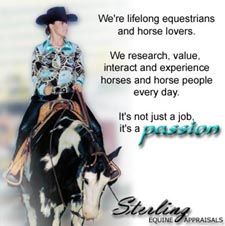After determining the virus that caused the death of one horse in California and the quarantine of 17 others is closely related to a single Utah horse show, the University of California Davis has informed horse show and event managers that the shows can go on – albeit carefully.
The UC Davis Veterinary Medical Teaching Hospital informed horse show and event managers Tuesday it has concluded the EHV-1 outbreak is centered around horses that were present at the National Cutting Horse Association’s Western National Championships held at the Golden Spike Event Center in Ogden Utah, from April 30 to May 8 or the Kern County Cutting Event in Bakersfield on May 13. This includes cutting horses that did not attend either of these two events but have subsequently come into contact with horses from those events.
Instead of recommending the suspension of all horse shows throughout the region in the coming weeks, UC Davis suggests show and event managers incorporate precautionary steps to minimize the risk for all participants. These steps include a “no fever” policy for all horses at the event as well as a strict verification from participants upon arriving at a horse show venue that all horses on arrival had no contact whatsoever with either the suspect cutting events nor any horses that attended them.
“It is understood that some or most horses with a fever will not have EHV-1; however, in the interest of conducting a safe event under the current circumstances, the no fever policy will be enforced,” UC Davis said in a prepared statement. “If you do not wish to comply with these safety measures please do not attend the event.”
Show managers have embraced the UC Davis announcement as a positive step toward normalcy in a regional show scene that has been disrupted the last week while state officials evaluated the nature of the EHV-1 outbreak.
“UC Davis and California Department of Food and Agriculture have come out with a thoughtful explanation of what are reasonable steps to take for horse owners at competitions in light of the current course the EHM strain of EHV-1 has taken,” said Robert Kellerhouse, General Manager of Galway Downs Equestrian Center in Temecula, where last weekend’s Greater San Diego Hunter Jumper Association show was cancelled because of the outbreak. “I am very pleased that the experts at UC Davis and CDFA have analyzed the facts and provided a path for people to follow to better protect their horses at competitions.”
Kellerhouse added that one competition under his management, the Event at Woodside, will take place this weekend as scheduled.
The Memorial Day Classic hunter-jumper show scheduled for this weekend at the Los Angeles Equestrian Center is on schedule, but show officials say worried horse owners are staying home. As of Tuesday, two-thirds of the anticipated 600 horses expected in the show, a traditional centerpiece to the region’s show season, are not scheduled to participate, said Marnye Langer, Vice President of Langer Equestrian Group.
“It is now beginning to pick up a little, but much of the damage has been done, “ said Langer. “We have lost sponsors. Arena businesses are being impacted by this. Local charity groups that hold fund-raising activities at the Memorial Day Classic will be making little or no money.
“While the internet is a great tool and resource, it can also fuel the fires of misinformation and heightened emotions,” added Langer, whose event team managed a Colorado show through the crisis before returning to California for the Memorial Day Classic. “No one wants to see horses get sick. We pride ourselves on running safe, excellent, exciting events — horses are not dying right and left, the disease is not spreading like wildfire, the state is not quarantining facilities right and left.”
The state reports no new cases of Equine Herpes Myeloencephalopathy (EHM) caused by EHV-1 since Monday in California. The count of horses testing positive for the virus is 18 across 12 counties, including Amador (1), Glenn (2), Kern (2), Los Angeles (1), Marin (1), Napa (1), Placer (3), Plumas(1), Sacramento (1), Shasta(1), Stanislaus (3) and Ventura (1).
CDFA has quarantined all infected horses and continues to advise that horses returning from those events and horses that have subsequently come into contact with returning horses avoid moving from their home premises until California has gone 14 days without a new case of EHM.
A mare that did not particpate in either of the cuttings yet exhibited signs of EHM was subject of an investigation by Anmal Health Branch veterinarians who determined she did not have the same strain of virus as the horses in the confirmed cases. The mare, a participant in the Rancheros Vistadores ride in Santa Ynez May 5 – 12, reportedly exhibited neurological signs compatible with a number of equine diseases or conditions, but three sets of nasal swabs and blood testing on this mare indicated she was negative for the mutant strain of EHV-1 that causes EHM. Instead, she tested positive for a more common strain of EHV-1 that most frequently causes respiratory signs and on rare occasion causes neurological signs.
Wednesday, May 25, 2011
UC Davis: The shows CAN go on – carefully
Subscribe to:
Post Comments (Atom)



No comments:
Post a Comment